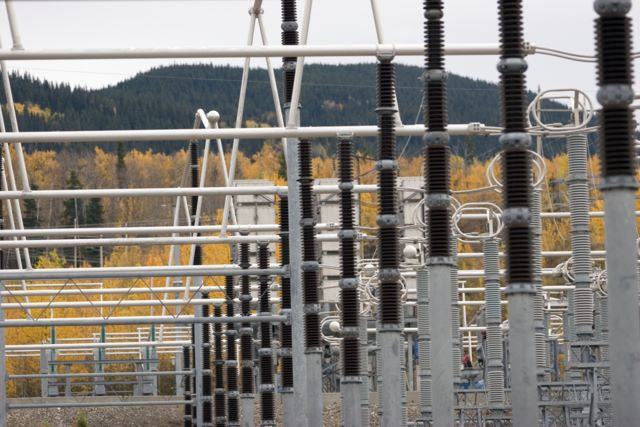You can change the political conversation. Chip in to rabble’s donation drive today!
It didn’t take very much time at the joint federal-provincial environmental hearing into Site C, which started last week in Fort St. John, to realize that it is not the best forum to address the central issue underlying BC Hydro’s proposal to develop the $8 to $9 billion hydro project.
The central issue is the province’s energy policy, a confusing mix of clean energy directives severely constraining BC Hydro’s planning and operations combined with an economic development strategy based in part on the offer of cheap power to industry — cheap power that BC Hydro says it does not have.
There is little doubt that it is the province’s energy policy that underlies BC Hydro’s proposal to build Site C. It is hard to overstate how much impact that policy has had.
On the one hand, the government’s policy on electricity rates is contributing to rapid growth in the demand for electricity. While there rightfully has been a political uproar over the unnecessary investments, power purchases and other costs driving up BC Hydro’s rates, the fact is that rates, particularly for large new users, should be higher than what they are now. In the industrial sector, the rates that new customers pay are less than half the cost of the new supply that BC Hydro says it will need in order to meet the requirements that the large new users impose on the system.
At the same time as government is encouraging rapid growth in the demand for electricity with effectively subsidized low rates, its self-sufficiency and clean energy directives are preventing BC Hydro from meeting the growth in requirements in the most cost-effective way.
By far the lowest cost source of supply that BC Hydro used to take advantage of, and would want to continue to do so if not for government policy, is the large amount of non-firm hydro within British Columbia and the low cost seasonally surplus hydro, wind and off-peak thermal power generally available from neighbouring utilities.
To do that reliably, however, BC Hydro needs gas-fired thermal generating capacity within the province — not thermal capacity to operate as a base load plant as in Alberta and other jurisdictions, but rather back-up capacity that it could turn to in drought years if needed when there is limited hydro production, or in years like 2001 when spot market prices skyrocketed. It needs thermal back-up to operate its hydro system in the most efficient way.
However, for reasons never made clear, and contrary to the advice of the BC Utilities Commission and the interests of BC Hydro’s ratepayers, government policy has prevented BC Hydro from maintaining or developing the back-up thermal capacity it needs. The government has forced BC Hydro to shut down the back-up that used to be provided by the Burrard thermal plant and, according to BC Hydro witnesses at the Site C hearing, is preventing Hydro from developing new low cost thermal back-up to replace what was lost with the shut down of Burrard.
There is no clear economic or, I would argue, environmental justification for this restriction on thermal back-up capacity that would eliminate or at least defer for many years the need for Site C. The development of Site C would have significant unavoidable environmental and social impacts. And even though its lifecycle GHG emissions would be small, the thermal back-up that could avoid or defer the need for Site C would also not generate a large amount of emissions because it would seldom have to be used. It is the thermal back-up enabling greater reliance and use of non-firm hydro and spot market energy, not the thermal production that BC Hydro needs.
The joint federal provincial panel investigating the environmental and social impacts of Site C has been presented with evidence making these points — evidence that BC Hydro did not challenge or dispute. And perhaps that will have some impact on the panel’s report and recommendations.
Clearly, however, what is required is not simply a hearing into the impacts of a specific project, with a limited review of need and justification. Rather a thorough independent inquiry into the full range of major government policy issues that underlie the stated need and justification is required.
We need an inquiry to consider carefully the pricing of power for major new industrial loads and what I would argue is the outdated logic of attracting new industry with the offer of cheap power we do not have. Indeed, the pricing of power more generally, together with the protection of low-income households, is something that needs to be examined comprehensively if we are truly committed to efficient and fair conservation and use of electricity.
We need an inquiry to examine the restrictive provisions in the Clean Energy Act that have already cost BC Hydro hundreds of millions of dollars of needless expense and will cost literally billions more if not reconsidered. They were never well considered or justified.
And, if in the government and some people’s minds current government policy is necessary to promote electricification and the reduction in GHG emissions, then we need an inquiry to review how best we can sensibly and consistently impose GHG emission constraints on BC Hydro and everyone else. It makes little sense to impose huge costs on BC Hydro (not to mention to cause significant environmental and social costs with unnecessary projects) if the same restrictions and GHG costs are not imposed on everyone else.
There is a comprehensive and thoughtful environmental review of Site C taking place. But it was never meant to address the key questions that need to be addressed — nor is it the proper forum to do so.
Like this article? Chip in to keep stories like these coming!
Photo: BC Gov Photos/flickr



